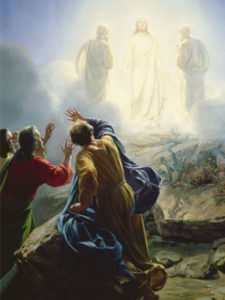Feast of the Transfiguration of the Lord
Daniel 7:9-10, 13-14
2 Peter 1:16-19
Luke 9:28b-36
Reflection:
The account of the Transfiguration of Jesus is in all the gospels readings except John’s gospel. The context of the other three gospel presentations is very similar. Before the account of the Transfiguration, the disciples of Jesus begin to seriously wonder who is this Jesus, who is this man to whom we are following, the Rabbi to whom we are listening and attaching ourselves. Following Jesus is becoming more challenging as the religious establishment begins to question and try to trap Jesus in a heresy. Probably the disciples are asking questions about Jesus not so much to understand Jesus better but more that they might know “what’s in it for us.”
After responding to Jesus that he is Elijah or some other prophet, Peter replies that Jesus is the Messiah, the Christ. How their imaginations must have begun to work on what it meant to be so closely associated with the Messiah, the Savior and Liberator of Israel. They could only imagine the glories and privileges that awaited them in the future. We all like to be associated with a prominent person. In our view that association makes us more important, and maybe there will be a status that trickles down to us.
Immediately after Peter’s profession, Jesus reminds the disciples that he, the Messiah, will suffer greatly, be rejected by the religious leaders and be killed. Jesus did briefly mention the resurrection after three days, but the disciples only heard the bad news. They could not believe what Jesus was saying. How could this happen to the Messiah. And what would this mean for their imagined future of advantage and prominence.
The Transfiguration, which happens a few days later, is a special moment of encouragement at a time of disillusionment and misunderstanding. God confirms the words of Jesus that the Messiah will suffer and die. “This is my beloved Son; listen to him.” Yes, a special moment in time that will help the disciples through the difficult days ahead. Their image of the Messiah has been challenged, but it will take time for them to really appreciate how Jesus understood his role as Messiah. They will not fully comprehend this until after the Resurrection and Ascension and Pentecost (Second Reading from St. Peter).
When our understanding of life, our dreams and hopes, our expectations are not being fulfilled, when disappointments bring us to disenchantment and cynicism, let us open our mind and hearts to Jesus to bring us a deeper level of understanding or perhaps to change our way of understanding. Let the imagination of Jesus into your heart and mind. It takes time as it took the disciples a long time to fully understand and accept the true mission of Jesus. Following in the footsteps of the disciples is our way to true joy and peace of mind.
Fr. Don Webber, C.P., is the director of the Office of Mission Effectiveness and resides in Chicago.

